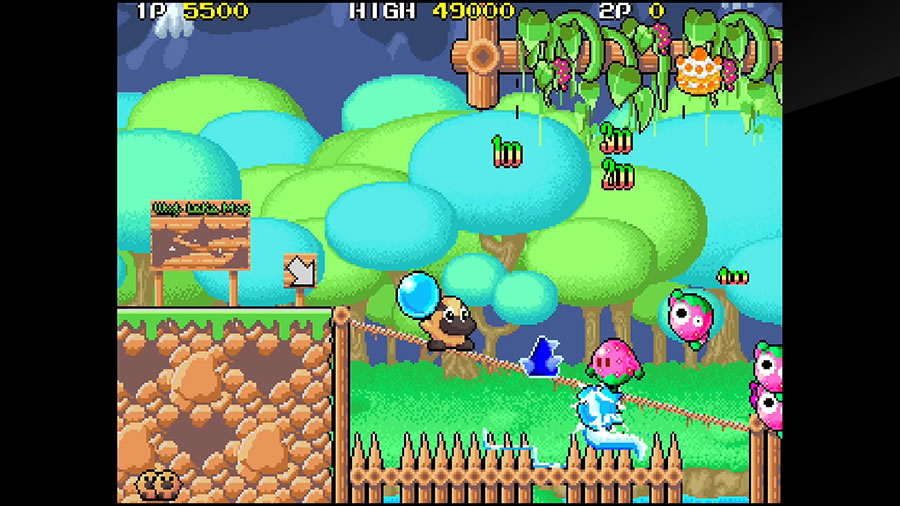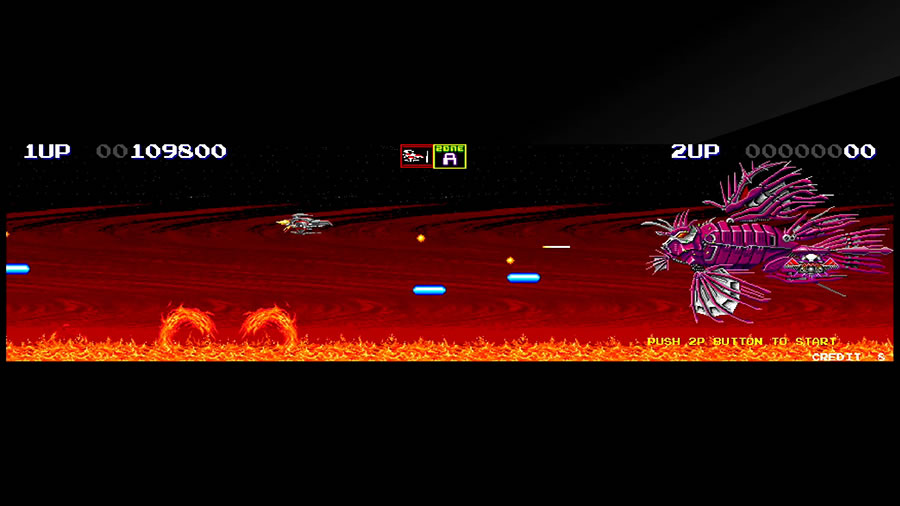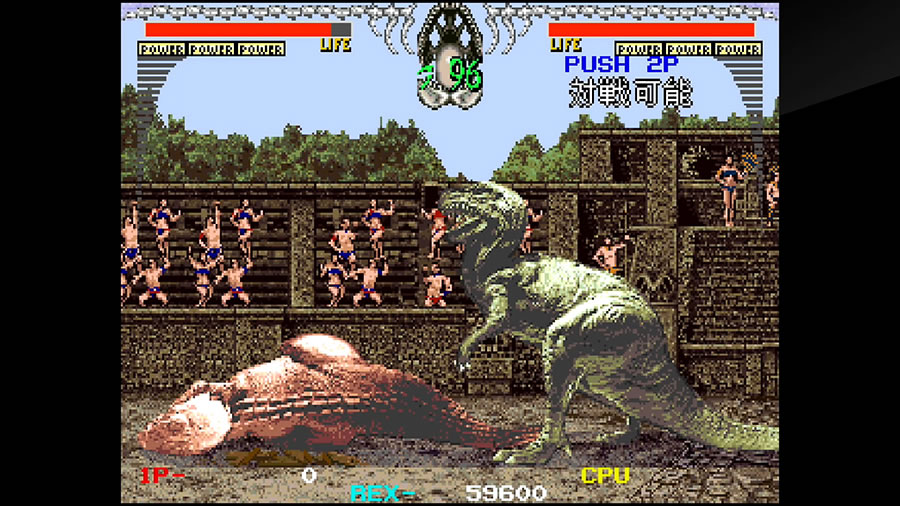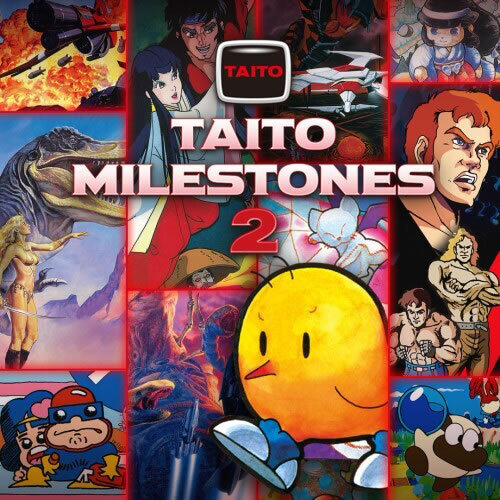- CLASSIC MAGAZINES
- REVIEW CREW
A show recapping what critics thought back
when classic games first came out! - NEXT GENERATION'S BEST & WORST
From the worst 1-star reviews to the best
5-stars can offer, this is Next Generation! - NINTENDO POWER (ARCHIVE)
Experience a variety of shows looking at the
often baffling history of Nintendo Power! - MAGAZINE RETROSPECTIVE
We're looking at the absolutely true history of
some of the most iconic game magazines ever! - SUPER PLAY'S TOP 600
The longest and most ambitious Super NES
countdown on the internet! - THEY SAID WHAT?
Debunking predictions and gossip found
in classic video game magazines! - NEXT GENERATION UNCOVERED
Cyril is back in this spin-off series, featuring the
cover critic review the art of Next Generation! - HARDCORE GAMER MAGAZING (PDF ISSUES)
Download all 36 issues of Hardcore Gamer
Magazine and relive the fun in PDF form!
- REVIEW CREW
- ELECTRONIC GAMING MONTHLY
- ELECTRONIC GAMING MONTHLY RANKS
From Mario to Sonic to Street Fighter, EGM
ranks classic game franchises and consoles! - ELECTRONIC GAMING MONTHLY BEST & WORST
Counting down EGM’s best and worst reviews
going year by year, from 1989 – 2009! - ELECTRONIC GAMING BEST & WORST AWARDS
11-part video series chronicling the ups and
downs of EGM’s Best & Worst Awards!
- ELECTRONIC GAMING MONTHLY RANKS
- GAME HISTORY
- GAME OVER: STORY BREAKDOWNS
Long-running series breaking down game
stories and analyzing their endings! - A BRIEF HISTORY OF GAMING w/ [NAME HERE]
Real history presented in a fun and pithy
format from a variety of game historians! - THE BLACK SHEEP
A series looking back at the black sheep
entries in popular game franchises! - INSTANT EXPERT
Everything you could possibly want to know
about a wide variety of gaming topics! - FREEZE FRAME
When something familiar happens in the games
industry, we're there to take a picture! - I'VE GOT YOUR NUMBER
Learn real video game history through a series
of number-themed episodes, starting at zero! - GREAT MOMENTS IN BAD ACTING
A joyous celebration of some of gaming's
absolute worst voice acting!
- GAME OVER: STORY BREAKDOWNS
- POPULAR SHOWS
- DG NEWS w/ LORNE RISELEY
Newsman Lorne Riseley hosts a regular
series looking at the hottest gaming news! - REVIEW REWIND
Cyril replays a game he reviewed 10+ years
ago to see if he got it right or wrong! - ON-RUNNING FEUDS
Defunct Games' longest-running show, with
editorials, observations and other fun oddities! - DEFUNCT GAMES QUIZ (ARCHIVE)
From online quizzes to game shows, we're
putting your video game knowledge to the test!- QUIZ: ONLINE PASS
Take a weekly quiz to see how well you know
the news and current gaming events! - QUIZ: KNOW THE GAME
One-on-one quiz show where contestants
find out if they actually know classic games! - QUIZ: THE LEADERBOARD
Can you guess the game based on the classic
review? Find out with The Leaderboard!
- QUIZ: ONLINE PASS
- DEFUNCT GAMES VS.
Cyril and the Defunct Games staff isn't afraid
to choose their favorite games and more! - CYRIL READS WORLDS OF POWER
Defunct Games recreates classic game
novelizations through the audio book format!
- DG NEWS w/ LORNE RISELEY
- COMEDY
- GAME EXPECTANCY
How long will your favorite hero live? We crunch
the numbers in this series about dying! - VIDEO GAME ADVICE
Famous game characters answer real personal
advice questions with a humorous slant! - FAKE GAMES: GUERILLA SCRAPBOOK
A long-running series about fake games and
the people who love them (covers included)! - WORST GAME EVER
A contest that attempts to create the worst
video game ever made, complete with covers! - LEVEL 1 STORIES
Literature based on the first stages of some
of your favorite classic video games! - THE COVER CRITIC
One of Defunct Games' earliest shows, Cover
Critic digs up some of the worst box art ever! - COMMERCIAL BREAK
Take a trip through some of the best and
worst video game advertisements of all time! - COMIC BOOK MODS
You've never seen comics like this before.
A curious mix of rewritten video game comics!
- GAME EXPECTANCY
- SERIES ARCHIVE
- NINTENDO SWITCH ONLINE ARCHIVE
A regularly-updated list of every Nintendo
Switch Online release, plus links to review! - PLAYSTATION PLUS CLASSIC ARCHIVE
A comprehensive list of every PlayStation
Plus classic release, including links! - RETRO-BIT PUBLISHING ARCHIVE
A regularly-updated list of every Retro-Bit
game released! - REVIEW MARATHONS w/ ADAM WALLACE
Join critic Adam Wallace as he takes us on a
classic review marathon with different themes!- DEFUNCT GAMES GOLF CLUB
Adam Wallace takes to the links to slice his way
through 72 classic golf game reviews! - 007 IN PIXELS
Adam Wallace takes on the world's greatest spy
as he reviews 15 weeks of James Bond games! - A SALUTE TO VAMPIRES
Adam Wallace is sinking his teeth into a series
covering Castlevania, BloodRayne and more! - CAPCOM'S CURSE
Adam Wallace is celebrating 13 days of Halloween
with a line-up of Capcom's scariest games! - THE FALL OF SUPERMAN
Adam Wallace is a man of steel for playing
some of the absolute worst Superman games! - THE 31 GAMES OF HALLOWEEN
Adam Wallace spends every day of October afraid
as he reviews some of the scariest games ever! - 12 WEEKS OF STAR TREK
Adam Wallace boldly goes where no critic has
gone before in this Star Trek marathon!
- DEFUNCT GAMES GOLF CLUB
- DAYS OF CHRISTMAS (ARCHIVE)
Annual holiday series with themed-episodes
that date all the way back to 2001!- 2015: 30 Ridiculous Retro Rumors
- 2014: 29 Magazines of Christmas
- 2013: 29 Questionable Power-Ups of Christmas
- 2012: 34 Theme Songs of Christmas
- 2011: 32 Game Endings of Christmas
- 2010: 31 Bonus Levels of Christmas
- 2009: 30 Genres of Christmas
- 2008: 29 Controls of Christmas
- 2007: 34 Cliches of Christmas
- 2006: 33 Consoles of Christmas
- 2005: 32 Articles of Christmas
- 2004: 31 Websites of Christmas
- 2003: 29 Issues of Christmas
- 2002: 28 Years of Christmas
- 2001: 33 Days of Christmas
- NINTENDO SWITCH ONLINE ARCHIVE
- REVIEW ARCHIVE
- FULL ARCHIVE
Taito Milestones 2
While the name Taito may not be as known today as Capcom and Sega, there once was a time when they dominated the arcade scene. With hits like Space Invaders, Bubble Bobble, Arkanoid and Chase HQ, Taito was responsible for many of the top coin-op games of the 1980s and 90s. In fact, they have so many great titles under their belt that they could spend the next decade releasing killer game compilations and still not even come close to covering them all. Don’t believe me? Then let me draw your attention to the Taito Milestones series, which had its first installment debut last year and has already announced the third compilation will drop in 2024. The second game in the collection just hit Switch a few days ago, bringing with it ten more Taito classics that range from recognizable hits to obscure gems. There are some incredible games in this package, but is it worth $40? That’s what we’re about to find out when I review Taito Milestones 2 on the Switch.
If you played the first game, then you’re going to feel right at home with Taito Milestones 2. This is a barebones compilation featuring ten more Taito classics, all of which had previously been released as part of the Arcade Archives series. There’s no theme connecting the titles, it’s just a grab bag full of different years and genres. The one constant is that each game comes with its own settings, customization, manual, online rankings and more, giving us control over how we experience each and every one of the games in this collection.
Spanning the years 1984 to 1992, there’s a nice mix of genuine hits, underappreciated classics and hidden gems. There are also a couple of clunkers, which is par for the course when it comes to this type of compilation. With only ten games, we’re going to take a critical look at each of titles featured in Taito Milestones 2.
Ben Bero Beh (1984): Let’s start with Ben Bero Beh, a 1984 action game starring a firefighting superhero who seems to exclusively help damsels in distress. While it may be the oldest game in the collection, Ben Bero Beh still has a lot going for it. The single-screen action reminds me a lot of the original Donkey Kong, where our hero needs to go from floor to floor dodging obstacles and putting out fires. The gameplay is a bit sluggish and there are a lot of cheap deaths here, but this cult classic is worth playing at least once or twice. I had a good time once I got the hang of the slow pacing.
The Legend of Kage (1985): Sure, The Legend of Kage is flawed and a little hard to get into 38 years later, but once you get the hang of it, this fast-paced ninja game is so much fun. It’s an action game that bucks almost every convention, starting with the very first level, where we’re walking from right to left. It’s also in the way Kage can leap dozens of feet in the air and climb the trees like a cat. I love how vertical the stages are and how much variety there is from one section to the next. Unfortunately, there are a lot of cheap hits and the gameplay takes a little getting used to, but The Legend of Kage the fastest and most exciting action game in this package.
Kiki Kaikai (1986): Taito Milestones 2 is packed full of great shoot ‘em ups, and Kiki Kaikai is easily one of the best. If the game looks familiar, then it might be because this 8-bit action game was followed by a Super NES sequel called Pocky & Rocky, a cult classic that everybody should seek out immediately. Kiki Kaikai is full of cool villains, tough bosses and levels that will have you walking in every direction. I’m not saying this is the best game in the package, but it’s definitely one of my favorites.
The New Zealand Story (1988): Of all the games features in this compilation, The New Zealand Story is the one that has been ported to the most different systems. It’s easy to see why when you start playing it, as it stars an immensely likeable kiwi hero trying to survive a colorful world with a ton of cool weapons. This is one of those 2D platformers that gets everything right, especially when it comes to the variety. In just the first couple stages, we go from jumping on floating platforms to diving underwater to exploring the skies in a hot air balloon. There are definitely elements that have aged poorly in the last 35 years, but The New Zealand Story remains one of Taito’s best platformers, and a great addition to this collection.
Darius II (1989): In a sea full of great shooters, Darius II stands above them all. This is a port of the epic three-monitor arcade cabinet, which gives players an unprecedented super-wide display full of fish-themed aliens. From the insane detail on the bosses to the cool power-ups to the way we’re able to choose our own path between levels, there’s so much to love about this game. It’s the rare kind of arcade shooter where you can replay the game multiple times and not see the same batch of levels. With so much replay and that awe-inspiring widescreen display, Darius II is the one game in this package I’m going to return to time and time again. One of the 1980s best shooters is also a real highlight in this collection.
Liquid Kids (1990): Now here’s a fun little platformer. Liquid Kids is a bright and colorful game starring a hippopotamus named Hipopo who throws water bombs that will freeze the enemies in their tracks. While the heroes, location and gameplay may be different, Liquid Kids reminds me a lot of Bubble Bobble. The way the water bombs work against not only the enemies but also the vehicles and level obstacles is unique, making this one of the most enjoyable games in the package.
Gun Frontier (1990): Gun Frontier is yet another reminder that Taito knows how to make great shoot ‘em ups. This is a vertical-scrolling shooter inspired by the Wild West, but not like Capcom’s Gun Smoke. Instead of a literal western, this is more in spirit, giving us a space shooter set in the 22nd century that takes its influence from old Clint Eastwood movies. The result is a fairly straight-forward shooter with a great sense of style. It’s challenging but fair, expertly crafted by some of the best shoot ‘em up developers of the era. And before you ask, yes, it’s way better than that that 2011 movie Cowboy vs. Aliens.
Solitary Fighter (1991): Solitary Fighter may have been released the same year as Street Fighter II, but this fighting game feels a thousand years old. This is a one-on-one fighter that is very much locked in the past, which makes this arcade oddity feels more like Pit-Fighter than Street Fighter. Many of the stages let you walk around, almost as if this was a one-on-one version of Final Fight or Streets of Rage. In that sense, it reminds me a lot of the two-player mode in the Nintendo Entertainment System version of Double Dragon. While I like how big and detailed the characters are and that it plays better than Pit-Fighter, Solitary Fighter is one of the weaker entries in this collection. If only Taito was as good at making fighting games as they are shooters.
Metal Black (1991): It shouldn’t come as a surprise that the company that brought us the Darius franchise knows a thing or two about making great shoot ‘em ups. Metal Black is another great example of Taito’s excellence in the genre, and it’s easily one of my favorite games in the package. The levels look great, the bonus stages are creative and there’s something addictive about upgrading your weapon dozens of times. With the exception of a Saturn port that never found itself way outside of Japan, this is one of those arcade shooters that never got much console love. As a result, it’s a classic shooter that many genre fans haven’t played before, and boy are they in for a treat. Metal Black is a great game.
Dino Rex (1992): The newest game in the collection is 1992’s Dino Rex, a dinosaur-themed fighting game with more than a passing resemblance to Primal Rage. As a concept, there’s nothing cooler than the idea of two massive dinosaurs going at it. However, it was the horrible gameplay that led to the extinction of this game. We get a punch and kick button that you can manipulate by holding the joystick in different directions. For example, if you want your T-Rex to smack an opponent down with his giant tail, you would push the kick button while holding the up-right diagonal on the control pad. The problem is that the moves were finicky and slow, often not popping off in time to actually hit the opponent. Worse yet, the dinos have limited special moves, which means that everything ends up revolving around the power meter, a gauge you charge up by holding up on the joystick. I want to love Dino Rex, but the terrible gameplay will keep me from coming back any time soon.
As you can tell, it’s a bit of a mixed bag when it comes to Taito hits. I would say that about half of the games are great or even must-plays, while the rest range from being frustrating to interesting novelties. That batting average is fine when the compilation is cheap, but when the package costs $40, the decision may not be as cut and dry.
That price is especially offensive when you discover how barebones the package is. I hate to compare everything to what Digital Eclipse is doing, but we’re living in a post-Atari 50 world, and this type of barebones compilation just doesn’t cut it anymore. I’m not saying Taito needs to film hours of documentary footage and scan their fan letters, but this game doesn’t even give you a description of the game. There’s no context, no history and no pictures of the arcade cabinets. What you seen on the title screen is what you get, and it’s not enough to justify the $40 asking price. I love old school Taito and enjoy many of these games, but you’re better off waiting for a sale when it comes to Taito Milestones 2.
HOME |
CONTACT |
NOW HIRING |
WHAT IS DEFUNCT GAMES? |
NINTENDO SWITCH ONLINE |
RETRO-BIT PUBLISHING
Retro-Bit |
Switch Planet |
The Halcyon Show |
Same Name, Different Game |
Dragnix |
Press the Buttons
Game Zone Online | Hardcore Gamer | The Dreamcast Junkyard | Video Game Blogger
Dr Strife | Games For Lunch | Mondo Cool Cast | Boxed Pixels | Sega CD Universe | Gaming Trend
Game Zone Online | Hardcore Gamer | The Dreamcast Junkyard | Video Game Blogger
Dr Strife | Games For Lunch | Mondo Cool Cast | Boxed Pixels | Sega CD Universe | Gaming Trend
Copyright © 2001-2025 Defunct Games
All rights reserved. All trademarks are properties of their respective owners.
All rights reserved. All trademarks are properties of their respective owners.






































